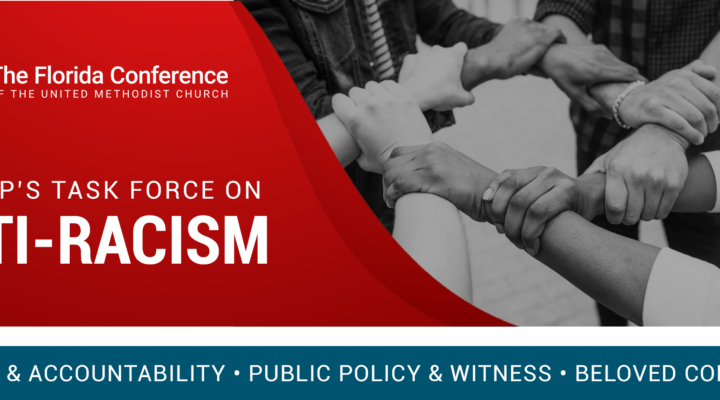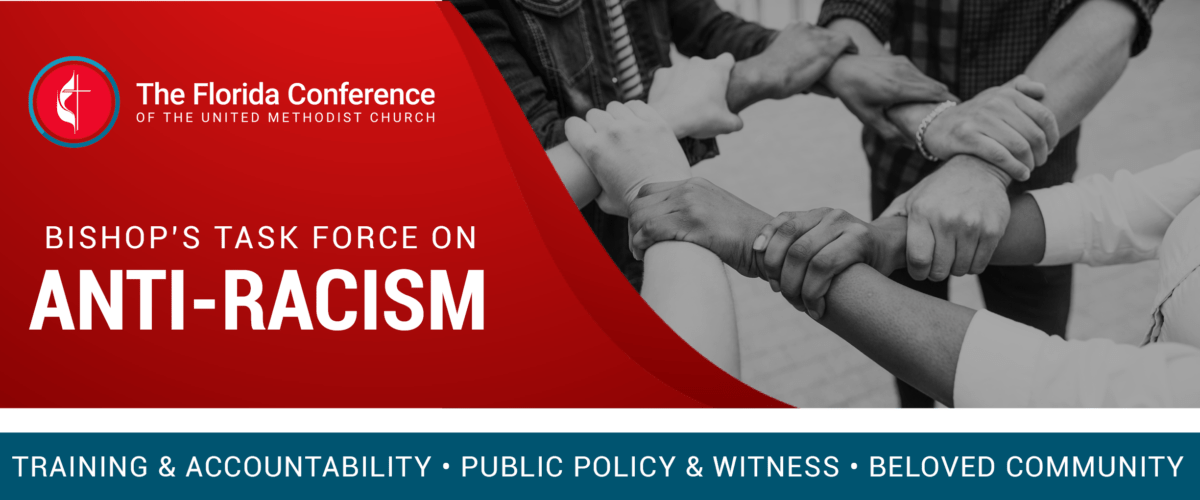In the year since The United Methodist Church launched its “Dismantling Racism” campaign, the U.S. units of the worldwide denomination have laid the groundwork for long-term efforts against white supremacy in both church and society. Whether vigorous institutional action can convince some naysaying United Methodists that endemic racism exists and must be eliminated remains to be seen.
United Methodists have a history of addressing social issues that goes back to Methodism’s founder, John Wesley. In addition to local efforts to care for the impoverished and dispossessed, Wesley often published tracts on social concerns, such as his influential pamphlet, “Thoughts on Slavery.”
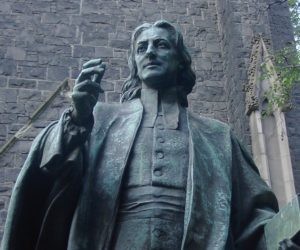
John Wesley
European Methodist theologian David N. Field recently wrote that Wesley “was one of the first prominent church leaders to oppose slavery as an institution and not merely the slave trade or aspects of slavery that were deemed particularly cruel. Wesley was prepared to take a stand against powerful social and economic forces, influential people, and a business sector that was major source of British wealth.”
A modern example of Methodist social action came in response to the police beating of Rodney King that sparked Los Angeles riots and prompted the 1992 General Conference to vote to establish a concept known as “Shalom Zones.” The idea — which possibly was the last spontaneous mission action by General Conference in the three decades since — was that United Methodist congregations in communities of color would serve as sanctuaries from violence and oases of social support in downtrodden neighborhoods.
“Wesley was prepared to take a stand against powerful social and economic forces, influential people, and a business sector that was major source of British wealth.”
The idea took root in battered Los Angles and around the denomination. The Council of Bishops even took an unprecedented step, assigning the late Bishop Felton E. May Jr. to the special project of developing a series of “saving stations” around the greater Washington, D.C., area, in 1993-94.
Housed for 15 years at the UMC’s mission agency, the General Board of Global Ministries, the program moved to Drew Theological Seminary in Madison, N.J., in 2008. At its height as a church-wide program in 2012, Communities of Shalom had trained 10,000 people worldwide and established 600 local communities, with more than 150 active sites in the United States, Haiti and Africa.
Bishop John Schol of the Greater New Jersey Area of the UMC reported that the initiative subsequently moved from Drew to the purview of annual conferences, the basic unit of United Methodist structure. Bishop Schol originated the “shalom” idea in 1992 and served on the initiative’s church-wide board.
“One important component of Shalom Communities was intercultural relationships as the initiative grew out of the Los Angeles uprising,” Bishop Schol said in an email. “Communities of Shalom was a contextual movement, and each of the key components, community organizing, community development, leadership development and strengthening intercultural relationships reflected the challenges and opportunities in a specific community.”
Bishop Schol said that in his Greater New Jersey conference, the Shalom initiative has evolved under the name Communities of Hope. “We presently have more than 20 sites,” the bishop reported. “We have also broadened the work of strengthening intercultural relations to include ending the sin of racism.”
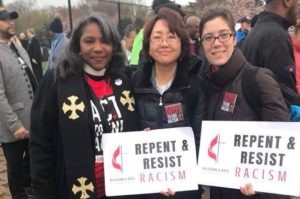 The Shalom Initiative’s evolution provided the Council of Bishops with an important model for Dismantling Racism: the initiative was decentralized so that its funding and implementation are supervised by annual conferences rather than any single church-wide agency as in the past. Dismantling Racism’s primary online home sits on the official United Methodist website, but the actual on-the-ground work is being done at conference and local-church levels.
The Shalom Initiative’s evolution provided the Council of Bishops with an important model for Dismantling Racism: the initiative was decentralized so that its funding and implementation are supervised by annual conferences rather than any single church-wide agency as in the past. Dismantling Racism’s primary online home sits on the official United Methodist website, but the actual on-the-ground work is being done at conference and local-church levels.
Among current examples of local, state and regional United Methodist anti-racism missions:
Northern Illinois Conference (Greater Chicago): The conference anti-racism task force is organizing a “DIY Rally Against Racism” in July. Each local church is encouraged to hold a rally “that will have maximum visibility” to its surrounding community while observing COVID-19 precautions and any local requirements for large gatherings. Churches as asked to register with the conference and publicize their efforts on social media with the hashtag #rallyagainstracism.
Indiana Annual Conference: In February, Indiana Bishop Julius Trimble announced the appointment of Annettra Jones as associate director of Diversity, Missions and Justice Ministries. The position was modified from previous responsibilities to emphasize diversity and anti-racism action. “Annettra will have a key role in leading in partnership with the Conference Task Force for Dismantling Racism and the Conference Commission on Religion and Race,” said her appointment announcement. She will lead development of a strategic plan “that demonstrates our commitment to anti-racism and to actively dismantling systemic institutional racism in the INUMC.”
Western North Carolina Conference: A webinar, “Equity and Justice: Eradicating the Other Pandemic,” took place June 7 to introduce William (Bill) White, director of the newly established Department of Equity and Justice Ministries. White was appointed to the new position by Bishop Paul Leeland effective April 1. As with the Indiana staff position, White will lead “strategic efforts in diversity, equity, inclusion and advocacy and help implement these practices in all areas of conference and local church ministry,” according to the Western North Carolina website.
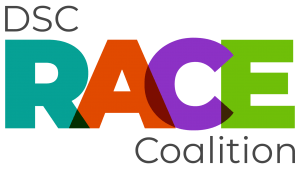 California-Nevada Conference: Cal-Nevada will host a Zoom conference for clergy and church personnel committees of the UMC’s Western Jurisdiction June 14 on “Understanding the Opportunity of Difference — A Cross-Racial/Cross-Cultural Training” intended to train church leaders on how to prepare congregations to receive pastors of a different race or culture.
California-Nevada Conference: Cal-Nevada will host a Zoom conference for clergy and church personnel committees of the UMC’s Western Jurisdiction June 14 on “Understanding the Opportunity of Difference — A Cross-Racial/Cross-Cultural Training” intended to train church leaders on how to prepare congregations to receive pastors of a different race or culture.
Desert-Southwest Conference: In 2020, chairs of the conference’s Commission on Religion and Race and the Ethnic Local Church Concerns Committee, in conversation with Bishop Bob Hoshibata, formed the DSC Race Coalition. Its name is an abbreviation for Reflection, Action, Courageous Dialogue and Engagement, and it is working to promote racially focused education and dialogue resources and eliminate racism within the conference.
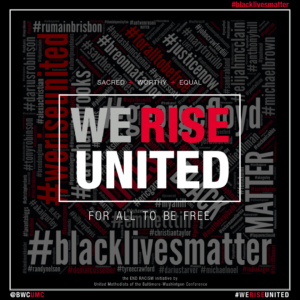 Baltimore-Washington Conference: BWC covers both the nation’s capital and one of the nation’s most racially fraught cities. Consequently the conference has designed a wide-ranging anti-racism initiative called “We Rise United for All to Be Free.” Among the many resources listed on the conference website is a video, Deconstructing White Privilege, featuring Robin DiAngelo, author of White Fragility: Why It’s So Hard for White People to Talk About Racism, from the church-wide General Commission on Religion and Race’s series, “Vital Conversations.”
Baltimore-Washington Conference: BWC covers both the nation’s capital and one of the nation’s most racially fraught cities. Consequently the conference has designed a wide-ranging anti-racism initiative called “We Rise United for All to Be Free.” Among the many resources listed on the conference website is a video, Deconstructing White Privilege, featuring Robin DiAngelo, author of White Fragility: Why It’s So Hard for White People to Talk About Racism, from the church-wide General Commission on Religion and Race’s series, “Vital Conversations.”
Florida Conference: Bishop Kenneth L. Carter anticipated the “Dismantling Racism” initiative by starting his own anti-racism task force in June 2020 in the wake of the deaths of Breonna Taylor, Ahmaud Arbery, George Floyd and Rayshard Brooks. According to the conference website, the task force includes three teams: training and accountability; public policy and witness; and “beloved community,” a reference to the concept of an ideal spiritual community fostered by theologian Howard Thurman and espoused by Civil Rights leader Martin Luther King Jr. Currently the task force is focused on teaching United Methodists to be informed voters and resisting legislative efforts at voter suppression.
Western Jurisdiction: The regional unit encompassing 11 states and the U.S. territory of Guam has scheduled a three-part series of webinars, plus a pre-recorded video worship service, around the Juneteenth celebration. The webinars are part of the jurisdictional initiative, “Where Love Lives,” launched last October “to celebrate radical inclusion and diversity” that includes LGBTQ acceptance as well as anti-racism efforts.
The task of eradicating racism portends nearly endless struggle, but perhaps a United Methodist multitude of small acts, like water drops, eventually will erode a mountain of racial prejudice. At least, that’s what many United Methodists hope.
Cynthia B. Astle is a veteran journalist who has covered the worldwide United Methodist Church at all levels for more than 30 years. She serves as editor of United Methodist Insight, an online journal she founded in 2011.

